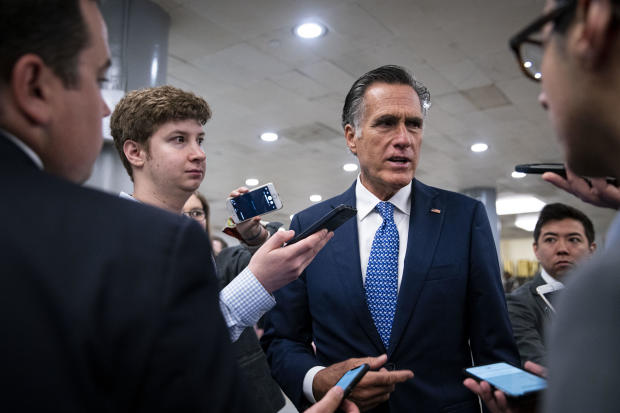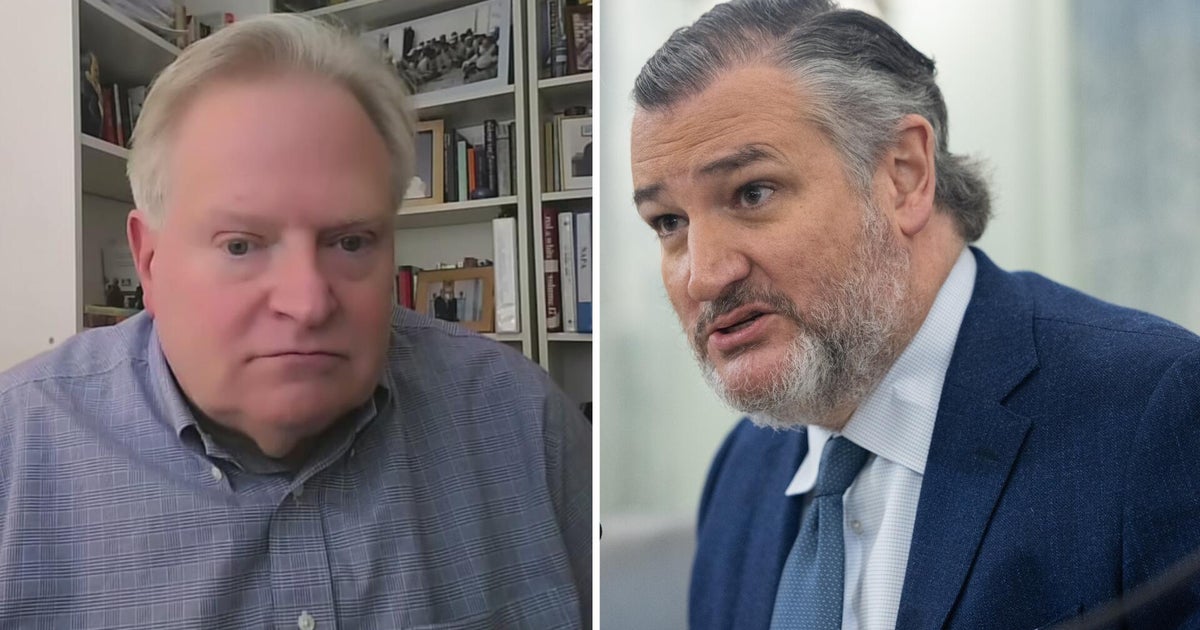Biden ends infrastructure negotiations with Republican senators
Washington — President Biden ended negotiations with Senator Shelley Moore Capito and Republicans over infrastructure legislation, telling Capito Tuesday that the latest GOP offer didn't "meet the essential needs of our country" to fix roads and bridges, prepare the nation for a future reliant on clean energy and create jobs, according to White House press secretary Jen Psaki.
Psaki said that Mr. Biden has talked with several House and Senate lawmakers over the past two days, and he appreciated Capito's efforts and "good faith conversations." But Psaki said the president was disappointed that Republicans had "increased their proposed new investments by only $150 billion" after he had reduced his plan by more than $1 trillion.
The president will now turn his attention to a bipartisan group of senators preparing their own infrastructure proposal. Psaki said he has spoken with Senators Kyrsten Sinema, Bill Cassidy and Joe Manchin, and he plans to stay in touch with a team of bipartisan lawmakers while he's in Europe on his first foreign trip.
The smaller bipartisan group led by Republican Senator Mitt Romney of Utah had been working on an alternative to the offer by Capito's group as a backup in case its talks with the White House foundered. Romney described this "subgroup" as comprising of five people, which has since expanded to around eight or nine senators. The smaller group will first propose their ideas to the "G-20," a group of 20 moderate senators of both parties.
Romney has said that his group's proposal includes components to pay for the legislation, a key sticking point in discussions between Capito and Mr. Biden. The president has advocated for raising the corporate tax rate from 21% to 28%, and for setting a minimum corporate tax rate of 15%, but this had been rejected by the Republican group.
Romney told reporters on Wednesday morning that his group would also not agree to any tax increases to pay for the proposal.
"We're not raising taxes," Romney said, although he later added that the proposal would not include user fees as a pay-for either, a red line for the White House. This sentiment was echoed by Republican Senator Rob Portman, another member of the group, who told reporters on Wednesday that raising corporate taxes "would be a huge mistake."
Romney told reporters later on Wednesday that his group had not yet been in contact with the White House.
"We're not dealing with the White House or President Biden or his staff at all. This is only being negotiated between Republican and Democrat senators, and we're in a good place," Romney said.
Democratic Senator Jon Tester said that it was "my understanding" that tax hikes were off the table.
"There's ways to do that, and hopefully won't be smoke and mirrors," Tester told reporters Wednesday. "This is probably the toughest part about this from my perspective."
He also acknowledged the difficulty of getting progressive Democrats to support legislation crafted with Republicans.
"It's going to take a lot of work," Tester said. Several Democrats have expressed frustration that the White House is continuing to work with Republicans, and raised concerns that this means certain priorities from Mr. Biden's initial proposal, such as green infrastructure, would be thrown by the wayside.
"An infrastructure package that goes light on climate and clean energy should not count on every Democratic vote," Democratic Senator Martin Heinrich tweeted Wednesday.
Romney indicated that the package being negotiated by his group would not include as many climate-related provisions.
"The Democrats agenda on climate change is probably something they're going to pursue by and large outside of an infrastructure bill," Romney said.
Portman also told reporters later on Tuesday that "the scope is infrastructure," and that it would not include "social programs."
When asked about the timeline for negotiations, Cassidy told reporters that the smaller group has a "first draft" that needs to be taken to a "wider audience."
"Whether or not we get something there depends on how quickly we can kind of bring it out to the wider audience," Cassidy said. "It has to be acceptable to both conferences, if you're going to get 60 votes."
The bipartisan House Problem Solvers Caucus has also been working on an infrastructure plan with Senators Cassidy, Sinema, Portman and Manchin, among others, and the co-chairs of the group, Congressmen Josh Gottheimer, Democrat of New Jersey, and Brian Fitzpatrick, Republican of Pennsylvania, briefed the White House Monday night on what their work. On Tuesday night, the bipartisan House group released a $1.2 trillion "physical" infrastructure framework, but they're still working with senators on how to pay for the plan. Their framework includes $761.8 billion in new spending over eight years.
Gottheimer said in a statement, "It's critically important that we get a robust infrastructure package signed into law, and that we do it with strong bipartisan support," and he said the group's framework "tackles everything from electric vehicles to clean water to fixing our crumbling bridges, tunnels, roads, and rail." Fitzpatrick called on Congress and the White House to "unite" and "move our transportation systems into the 21st century."
As the administration ended its negotiations with the GOP senators and engaged with the bipartisan group, Senator John Barrasso, Republican of Wyoming, told reporters there wasn't much evidence of compromise from Mr. Biden.
"The closest we ever were was the day we were in the Oval Office with the president," Barrasso said Tuesday. "He has never really moved toward us, in terms of core infrastructure he had lots of broad requests for things that the American people don't see as infrastructure, then he's never backed away from his desire to continue to want to raise taxes."
An administration official told CBS News that Mr. Biden asked Capito and her group whether they would be willing to significantly increase their offer, which was $928 billion over five years, with $257 billion in new spending. The president had previously lowered his offer from $2.3 trillion to $1.7 trillion. Capito offered an additional $50 billion in spending in a conversation with Mr. Biden on Friday, which the president rebuffed.
Funding has been a sticking point in the ongoing negotiations between Republicans and the White House. The Republican group had suggested using funds from previous coronavirus relief measures to pay for the bill, but the White House has turned this down and also opposes the idea of user fees.
In a statement on Tuesday, Capito said that she was "disappointed by his decision" to end negotiations.
"Throughout our negotiations, we engaged respectfully, fully, and very candidly — delivering several serious counteroffers that each represented the largest infrastructure investment Republicans have put forth," Capito said. "Despite the progress we made in our negotiations, the president continued to respond with offers that included tax increases as his pay for, instead of several practical options that would have not been harmful to individuals, families, and small businesses."
Capito added that Mr. Biden's decision "does not mean bipartisanship isn't feasible," noting that the Senate Environment and Public Works Committee had approved several bipartisan pieces of infrastructure legislation recently. If Mr. Biden is unable to reach a deal with the bipartisan group, Democrats may try to pass his infrastructure proposal through budget reconciliation, a process which allows legislation to pass with a simple majority vote. However, Manchin has said that he is unwilling to use reconciliation to pass an infrastructure bill as long as bipartisan negotiations are viable.
Senate Majority Leader Chuck Schumer suggested Tuesday that some provisions included in Mr. Biden's plan could be passed through reconciliation, while other parts would be approved traditionally.
"It may well be that part of the bill that will pass will be bipartisan, and part of it will be through reconciliation, but we're not going to sacrifice the bigness and boldness in this bill. We will just pursue two paths and at some point they will join," Schumer said in a press conference.
Psaki said in her statement that Mr. Biden had also spoken to Schumer "to discuss the need to commence work on the budget resolution process so that legislation to advance the President's economic priorities and tax reform plans could move to the Senate floor in July."
Aaron Navarro contributed to this report.




